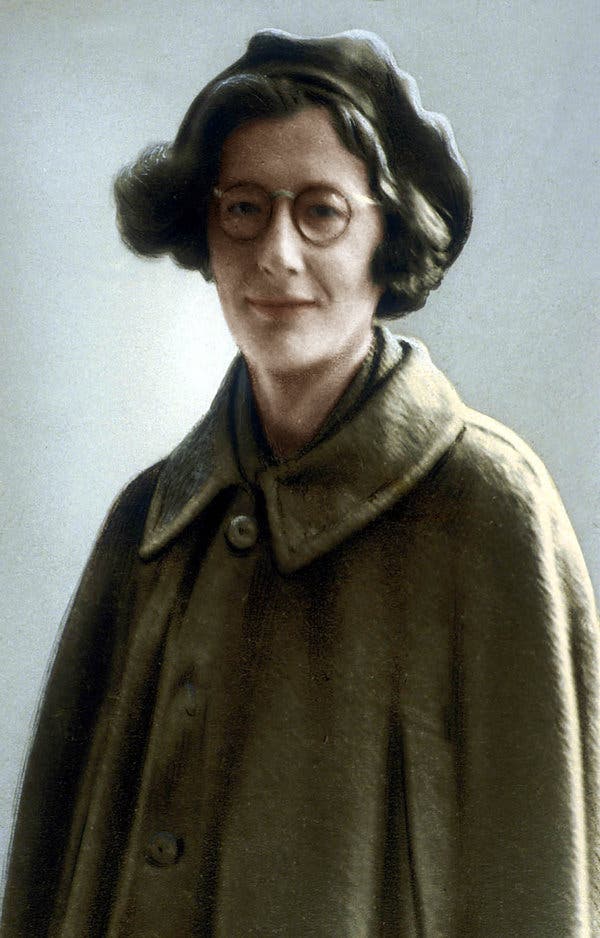
Spiritual Sunday
In a conversation with colleague and friend John Gatta, I learned that my favorite George Herbert poem had a profound impact on French mystic Simone Weil. She encountered it at a time when she was grappling with doubts and also migraine headaches.
Although raised an agnostic Jew and frequently engaged in political activism (including the Spanish Civil War), in her late twenties Weil began exploring Christianity. While suffering from crippling migraines, she encountered first choral singing and then Herbert’s “Love (3).” At that point, as she writes in her spiritual autobiography, “Christ himself came down and took possession of me”:
In 1938 I spent ten days at Solesmes, from Palm Sunday to Easter Tuesday, following all the liturgical services. I was suffering from splitting headaches; each sound hurt me like a blow; by an extreme effort of concentration I was able to rise above this wretched flesh, to leave it to suffer by itself, heaped up in a corner, and to find a pure and perfect joy in the unimaginable beauty of the chanting and the words. This experience enabled me by analogy to get a better understanding of the possibility of loving divine love in the midst of affliction. It goes without saying that in the course of these services the thought of the Passion of Christ entered into my being once and for all.
There was a young English Catholic there from whom I gained my first idea of the supernatural power of the sacraments because of the truly angelic radiance with which he seemed to be clothed after going to communion. Chance — for I always prefer saying chance rather than Providence — made of him a messenger to me. For he told me of the existence of those English poets of the seventeenth century who are named metaphysical. In reading them later on, I discovered the poem of which I read you what is unfortunately a very inadequate translation. It is called “Love”. I learned it by heart. Often, at the culminating point of a violent headache, I make myself say it over, concentrating all my attention upon it and clinging with all my soul to the tenderness it enshrines. I used to think I was merely reciting it as a beautiful poem, but without my knowing it the recitation had the virtue of a prayer. It was during one of these recitations that, as I told you, Christ himself came down and took possession of me…Moreover, in this sudden possession of me by Christ, neither my senses nor my imagination had any part; I only felt in the midst of my suffering the presence of a love, like that which one can read in the smile on a beloved face.
In the poem, Christ bestows his love despite the speaker’s intense feelings of unworthiness:
Love bade me welcome. Yet my soul drew back
Guilty of dust and sin.
But quick-eyed Love, observing me grow slack
From my first entrance in,
Drew nearer to me, sweetly questioning,
If I lacked any thing.
A guest, I answered, worthy to be here:
Love said, You shall be he.
I the unkind, ungrateful? Ah my dear,
I cannot look on thee.
Love took my hand, and smiling did reply,
Who made the eyes but I?
Truth Lord, but I have marred them: let my shame
Go where it doth deserve.
And know you not, says Love, who bore the blame?
My dear, then I will serve.
You must sit down, says Love, and taste my meat:
So I did sit and eat.
The idea that Christ will come to us in our affliction spoke deeply to Weil, and she sent the poem to her imprisoned brother and to the paralyzed poet Joe Bosquet. As Diogenese Allen writes in an article on Herbert and Weil,
It was a poem which uses the imagination that enabled Weil to break through to a domain above the intellect. The experience gave her the incentive…to assemble material to develop an epistemology [a theory of belief] which related beauty, truth, pain and supernatural good, and thus to achieve full conviction. She then can write such things as “The true mysteries of the Faith are themselves absurd but their absurdity is such as to illumine the mind and cause it to produce in abundance truths which are clear to the intelligence.”
Literature and religion have a lot in common in that respect.